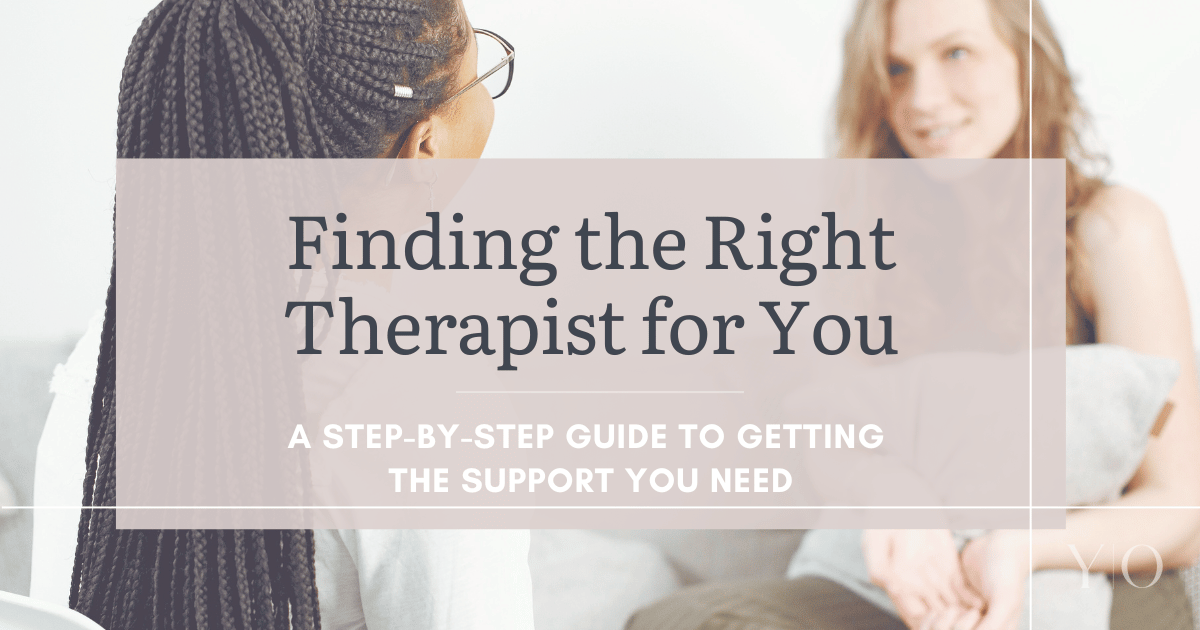When life feels overwhelming, having someone to talk to can be life changing. But with so many different therapists available, how do you know which one is right for you? Finding the right therapist is an important first step toward improving your mental health and well-being. It’s essential to connect with someone who makes you feel understood, respected, and supported. Here’s a step-by-step guide to help you navigate this process and choose the best fit for your needs.
Table of Contents
Understand What You Need
The first step in finding the right therapist is understanding what you’re looking for in therapy. What issues are you seeking help with? Do you need someone who specializes in anxiety, depression, insomnia, chronic illness, trauma, or another area? Understanding your goals can help narrow down your search. Some people may prefer a therapist with a specific approach, such as Acceptance and Commitment Therapy (ACT), Cognitive Behavioral Therapy (CBT), or mindfulness-based practices. Knowing your preferences can also make the search more manageable. If you’re unsure about what you need, don’t worry, your therapist will help you clarify your goals during your initial sessions. It’s perfectly okay to start the process with an open mind and explore options as you go.
Check Credentials and Specialties
Therapists come from diverse educational backgrounds, each bringing unique strengths to their work. Most therapists hold either a master’s degree in fields like social work or marriage and family therapy, or a doctoral degree in clinical or counseling psychology (Ph.D. or Psy.D.). Master’s level therapists are skilled in providing psychotherapy, fostering emotional processing, and supporting individuals, couples, and families in navigating life’s challenges. Their training emphasizes relational dynamics, resilience-building, and connecting clients with meaningful resources within their communities. Doctoral level psychologists bring expertise in both the science and practice of mental health treatment. Their training includes psychotherapy, psychological assessment, and research-backed interventions tailored to each client’s needs. In addition to addressing complex mental health conditions, they offer insight into emotional processing, relationship patterns, and evidence-based strategies for personal growth and well-being. Both pathways prepare therapists to provide compassionate, effective care, helping clients build meaningful change and achieve their goals. In addition to educational background, it’s helpful to consider whether a therapist has specialized training in specific therapeutic approaches (e.g., ACT, CBT, etc.) or expertise working with specific presenting concerns which ensures that their expertise aligns with your specific needs and therapy goals. Ultimately, what matters most is finding a therapist whose approach feels like the right fit for you. Credentials and training offer helpful information and a strong therapeutic relationship where you feel heard, supported, and guided is essential to successful therapy outcomes.
Consider the Therapist’s Approach and Style
Everyone connects with people in different ways, and the same is true for therapy. Some people prefer a therapist who is warm, empathetic, and validating, while others might prefer someone more direct and structured. In addition, consider whether the therapist uses evidence-based treatments that have proven effective for your specific issues. Therapists may describe their approach as:
- Acceptance and Commitment Therapy (ACT): Focuses on helping individuals accept their emotions and thoughts rather than fighting them, while also committing to actions that align with their values and improve their overall quality of life. It’s effective in treating anxiety, depression, trauma, and a range of other mental health concerns by teaching skills for managing distressing thoughts.
- Cognitive Behavioral Therapy (CBT): A widely used approach that helps individuals identify and change negative thought patterns and behaviors. It’s effective in treating anxiety, depression, trauma, and a range of other mental health concerns by teaching skills for managing distressing thoughts, emotions, and behaviors.
- Cognitive Behavioral Therapy for Chronic Pain (CBT-CP): A specialized form of cognitive-behavioral therapy that focuses on helping individuals manage chronic pain by addressing thoughts, emotions, and behaviors that can worsen the pain experience.
- Cognitive Behavioral Therapy for Insomnia (CBT-I): A structured, evidence-based treatment specifically designed to help individuals struggling with chronic insomnia. This approach is particularly effective for those with long-term sleep difficulties, helping individuals regain healthy sleep habits and ultimately enhance overall well-being.
- Cognitive Processing Therapy (CPT): A structured, evidence-based therapy designed to help individuals process and overcome trauma, particularly post-traumatic stress disorder (PTSD). This therapy helps individuals reframe their trauma-related thoughts and regain a sense of control and well-being.
- Dialectical Behavior Therapy (DBT): Focuses on helping individuals manage intense emotions and develop coping skills. It blends cognitive-behavioral techniques with mindfulness practices and is often used to treat borderline personality disorder and other emotional regulation issues.
- Exposure and Response Prevention (ERP): A form of cognitive-behavioral therapy that is particularly effective for treating anxiety disorders, including PTSD, phobias, and Obsessive-Compulsive Disorder (OCD). This therapeutic process helps individuals learn to tolerate anxiety, reduce avoidance behaviors, and eventually decrease the intensity of their emotional reactions. ERP is especially beneficial for helping individuals face triggers and regain control over their responses.
- Family Systems Therapy: Focuses on improving communication and resolving conflicts within family dynamics. It addresses the relationships and interactions between family members, helping to promote healthier family functioning.
- Humanistic Therapy (Client-Centered Therapy): Centers on creating a warm, non-judgmental environment in which clients feel free to express themselves. This approach is rooted in the belief that people have the potential for self-growth and healing when they receive unconditional positive regard and empathy from their therapist.
- Psychodynamic Therapy: Examines unconscious thoughts, past experiences, and childhood patterns to help individuals understand how these influence their current behavior and emotional struggles. This approach can be particularly helpful for deep-seated issues and long-term change.
- Mindfulness-Based Therapy: Uses mindfulness techniques, such as meditation and breathing exercises, to help individuals stay present and reduce stress. It encourages greater awareness of one’s thoughts and feelings without judgment, which can be especially effective for anxiety and emotional regulation.
These are just a few of the different therapeutic approaches available. Each method has unique benefits, and choosing the right approach depends on the individual’s specific needs, goals, and personality. Think about which approach resonates with you.
Find Someone You Feel Comfortable With
The therapeutic relationship is crucial to the success of therapy. It’s important to feel comfortable and safe with your therapist in order to open up and explore sensitive issues. During your first session pay attention to how you feel. Does the therapist listen to you and make you feel understood? Are they respectful, nonjudgmental, and mindful of your boundaries? It’s normal for it to take time to build rapport, so if you don’t feel fully connected right away don’t worry. However, if the session felt uncomfortable or the proposed treatment does not align with your needs, it may be a sign that this therapist is not the right fit for you.
Consider Logistics and Practicalities
While emotional fit is crucial, there are also practical considerations. These include:
- Location: Do you prefer in-person therapy or are you open to online therapy? Online therapy can offer greater flexibility and convenience, but you might prefer the face-to-face connection that in-person sessions provide.
- Cost: Therapy can be expensive, but many therapists offer a superbill or accept insurance. Be sure to check if the therapist accepts your insurance plan or if there are other payment options.
- Availability: Make sure the therapist’s schedule fits with yours. You’ll want someone who has availability during the times that work best for you.
Don’t Be Afraid to Ask Questions
Before committing to therapy, don’t hesitate to reach out to potential therapists and ask questions. Here are some examples: What’s your therapeutic approach, and how do you think it can help me? How long do you expect therapy to take for someone with my issues? How do you handle confidentiality and privacy? Are you comfortable working with the specific issues I’m dealing with (e.g., anxiety, insomnia, trauma, etc.)? Asking these questions will help you get a clearer sense of the therapist’s style and whether they are equipped to help you. A good therapist will be open to answering your questions and discussing their process with you.
Trust the Process
Remember, therapy is a journey, not an instant solution. Building trust and seeing meaningful progress takes time, but with the right therapist you can make significant strides in your mental health and well-being. If after attending a therapeutic dose number of sessions you don’t feel comfortable or haven’t noticed progress, be sure to discuss this with your therapist. Therapy is a deeply personal experience, and the most important thing is finding the right fit for you.
Finding Support for Your Journey
If you’re ready to take the first step toward healing, finding the right therapist is a crucial part of the process. Take your time, ask questions, and trust that the right professional is out there for you. You don’t have to navigate life’s challenges alone – support is available. If you’re ready to start your journey toward finding the right therapist, Dr. Oren is available to guide you through the process and help you find the support you need. Don’t hesitate to reach out and take the first step toward a healthier, more balanced life.
Please note that the information provided in this blog post is for informational purposes only and is not intended as a substitute for professional therapy or mental health treatment.



